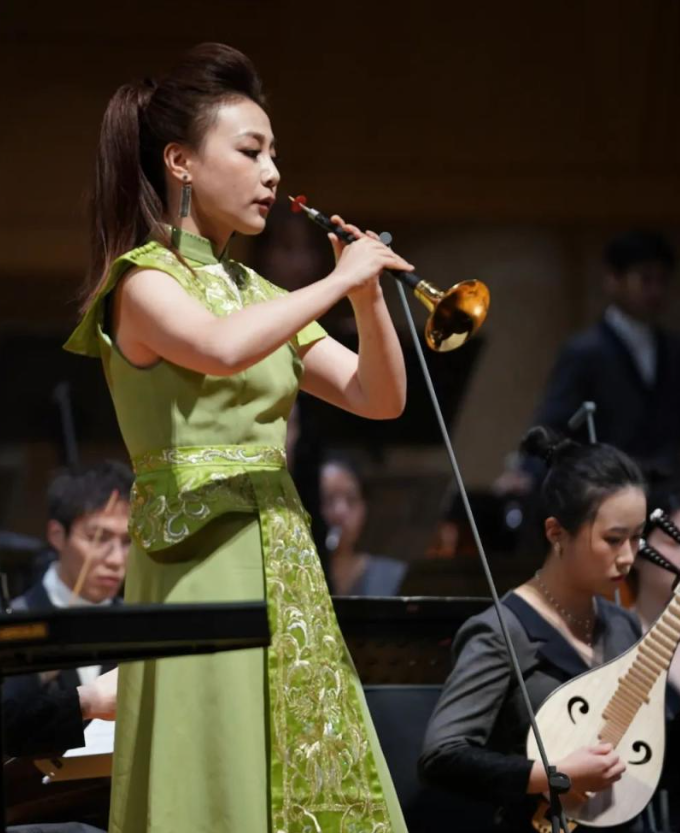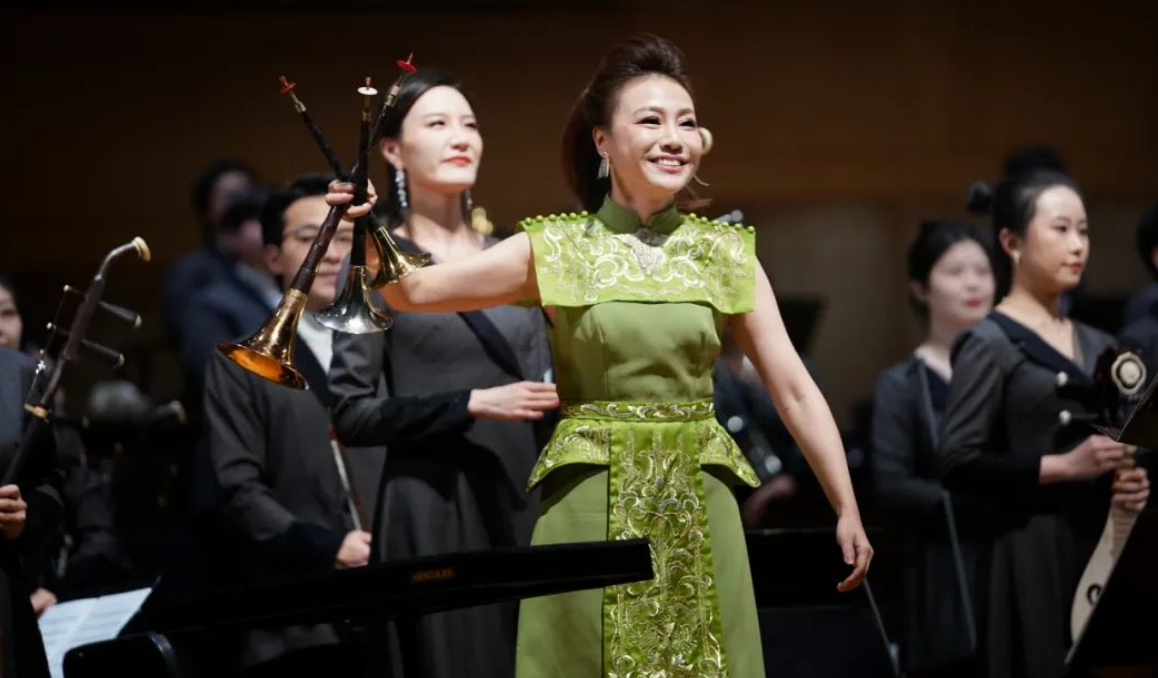Zhang Qianyuan: Thank you for letting more people hear the new suona works in this era
On the evening of October 29, the Beijing Nationalist Orchestra held the fourth "new talent" series concert "After Waves" at Zhongshan Park Concert Hall, and many new talent performers appeared on the stage. Among them, Zhang Qianyuan, a special guest and suona performer, first performed the new work "Jiao Tong's Heart", which was specially commissioned by her to create by Yue Lei Huanran. As the winner of the "Golden Bell Award" and the "Wenhua Award", Zhang Qianyuan has always hoped to leave more works for the Suona musical instrument. "Thanks to this era, we can keep the first performance of our new works and let more people hear it through the Internet."
Suona Works with Red Theme
In the past performances, Zhang Qianyuan found that the theme works specially created for Suona were very scarce. "Sometimes in some performances, in order to catch the theme of the whole concert, the director would like me to add one of the most representative melodies in" Ten Farewells to the Red Army "or" The Red Dants Bloom Red "to other suona works." The existing suona works either transplant songs with a high degree of singing or change the works created by composers for other instruments into suona versions. "The work played more frequently is" Brother of the Red Army is Back. "This was originally a piece of banhu music, which was later adapted into erhu, violin, suona and other instrumental music works." Zhang Qianyuan hopes that more composers who know Suona can create new works for Suona, so she thinks of Lei Huanran, her friend for more than 20 years.

"When I was in Grade One of the Affiliated High School of Shanghai Conservatory of Music, Lei Huanran was in Grade Six of the Affiliated Primary School." Zhang Qianyuan recalled that one of them learned suona and the other learned zither. Their similar age and identity as folk music learners made them form a deep friendship. Later, Lei Huanran began to learn to compose music after playing. From the zither works, he gradually compiled and created many folk music works. Through years of efforts, Lei Huanran is now not only a young zither player of Jiangsu Performance Group National Orchestra, but also a composer stationed in the group.
A few years ago, Lei Huanran created a work called "Sa" for zither, suona, electric guitar and drum, and then there was a band version. This work is not only lively, but also full of passion. When performing "Sa" on the stage, Zhang Qianyuan's suona performance is very infectious, which makes people immediately fascinated by suona and her performance. Because of the high praise, Zhang Qianyuan was also invited to play this work in the program "Fenghua National Music" of CCTV.
The success of Sa made Lei Huanran more interested in suona. Jiao Tong's Heart is her third suona work. Lei Huanran said, "At that time, when looking for creative direction for works, the whole country was carrying out activities to learn the spirit of Jiao Yulu. Henan itself is also the hometown of opera, and there are abundant opera music materials that can be excavated." So Lei Huanran and Zhang Qianyuan hit it off and decided to create a work in memory of Jiao Yulu, secretary of Lankao County, Henan Province.
Good works should be distracted

In order to create this work well, Lei Huanran found a lot of literature, film and television materials to have a deep understanding of Jiao Yulu. She hopes that this work will not express the memory of Jiao Yulu in the way of singing, but bring Jiao Yulu's selfless contributions to more audiences, especially young audiences, from the bottom of her heart.
In Jiao Tong's Heart, Lei Huanran made extensive use of local music elements, including Henan Henan Opera. "Henan Opera is high pitched and intense, which is quite consistent with the temperament of suona." In the performance of Jiao Yulu's fight against the disease, Lei Huanran fused the musical elements of the Henan Opera "The Humiliation Case" in his works At the same time, the work also uses the form of tight pulling and slow singing in opera. When the whole symphony orchestra moves fast, the suona is played freely and affectionately on it.
After the first edition of the work was completed, Zhang Qianyuan revised it to make the connection between different paragraphs more compact. Later, the two people expanded the Adagio section, adding 16 sections on the basis of the original 16 sections, so that the most touching part of the work can last longer. When playing this work, Zhang Qianyuan used three traditional suonas, high school, low school. The introduction part is a horn like tone. At this time, she uses a C-key mid tone suona. Even the high tone has a rich feeling, which is consistent with Jiao Yulu's character image. In the lyrical Adagio paragraph, she uses the traditional large G bass suona, which has a rich voice and can express emotions more sincerely. When Jiao Yulu is suffering from cancer and still leads the people to fight against natural disasters, Zhang Qianyuan uses a D high pitched suona to direct his high voice to his heart, which can better express the emotional catharsis here.
In order to enable the work to be considered technically and emotionally, Zhang Qianyuan found Qin Wenchen, the vice president and composer of the Central Conservatory of Music, after several rounds of revision, and asked him to give some suggestions on the work. Qin Wenchen carefully read the general score of the work, and called Lei Huanran for two hours. He affirmed the advantages of the work and put forward suggestions for revision. For example, at the beginning of the work, it simulates the grain feeling of wind sand by playing Sheng with air sound. "Mr. Qin thinks this idea is very good, but he only uses it once in the beginning, and can appear several times later to echo it." Lei Huanran said that Qin Wenchen's meticulous explanation made her gain a lot. "It's a great honor to get the guidance of Mr. Qin, and it will also help my later creation." Lei Huanran revised the work again, and she and Zhang Qianyuan were very satisfied with the effect presented in the premiere.
"On the night of the first performance, Jiao Tong's Heart was the last work in the first half. At the intermission, I saw a girl playing bamboo flute and two other players wiping their tears backstage." This moved Zhang Qianyuan. "The musicians of the professional orchestra have played a lot of excellent works. I think Jiao Tong's Heart is an affirmation of this work."
Suona is reborn
"It may be due to the fast pace of life, and the loud voice and strong tension of the suona, which can directly hit the hearts of young people. Now more and more young people have resonance with this instrument." Indeed, as Zhang Qianyuan said, in recent years, search for "suona" on various video websites and short video platforms, and you will see many young people playing this instrument, and many netizens have made videos related to various suona works. This makes Zhang Qianyuan's sense of mission stronger.
In 2016, the release of the film "Hundred Birds Descend to the Phoenix" brought Suona unprecedented attention. Xiao Jianghong's novel A Hundred Birds Describing the Phoenix depicts the two generations of suona artists and the process of the gradual demise of suona, a folk art form, under the pressure of modernization. After the novel was published, it was filmed by director Wu Tianming. As the third generation inheritor of "A Hundred Birds Pay homage to the Phoenix", Zhang Qianyuan personally realized that the performance frequency of this Suona work was significantly higher after the film was released. Zhang Qianyuan said, "I am very grateful to Mr. Xiao for choosing the suona in his novels to express the theme of 'inheritance'. He and Director Wu Tianming gave suona a platform, so that more people were moved by the sound of suona and the heritage carried by suona, and suona had more opportunities to meet the audience at the concert."
Zhang Qianyuan said, "Suona is an imported product on the Silk Road. After it was introduced to China, it has become the most popular national instrument. This is enough to prove that Suona is the same as human nature. It can enter the lives of ordinary people and play the voice of ordinary people, which is also the best proof that foreign things serve China and Chinese culture is inclusive." In the Internet era, Zhang Qianyuan also promoted Suona through network means. On Tiktok, she has more than 90000 fans. She will share some more academic suona works on the network, and will also carry out public suona teaching live broadcast. This year, she also held two solo concerts of "Silk Road Suona" by Zhang Qianyuan. In addition to her performance, she will introduce the origin, evolution and work guide of Suona on the stage. "I hope that by taking the opportunity of" A Hundred Birds Charming the Phoenix ", more audiences can go to the theater to listen to a suona concert, so that they can understand the suona and its works."
On the 25th of this month, Zhang Qianyuan will take the "Silk Road Suona" solo concert to Xiamen. She hopes to bring the concert to more cities, so that more audiences can hear the new works of Suona online and offline.
 渝公网安备 50010702504639号
渝公网安备 50010702504639号